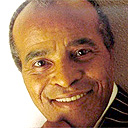
Nobody reminded the audience that Jon Hendricks was four months past 80 until he'd been holding them spellbound for at least an hour. So the warmth of the response was not about making allowances for this jazz-singing legend's survival, but almost entirely due to what he did during the gig.
Judging by the way he bounced downstairs to the Jazz Cafe's stage, gold suit gleaming, hat over one eye, Hendricks's declared intention to keep going until he's 100 seemed entirely feasible. His has been an astonishing life, in and out of music - working with the Franz Liszt of jazz piano, Art Tatum, when he was only 14, imprisoned for a year in the second world war for resisting racism in the US army, studying literature and law, and making a higher art out of the instrument-mimicking singing style of vocalese.
Hendricks sounds a shade croakier today, but his boldness in still going for every implausible vocal contortion he did in his prime (as well as the support of a fine trio) carried him through very occasional insecure moments, and his was a performance of irresistible spiritedness as well as musical sophistication.
He yodelled and scatted his way through a Miles Davis opener, delivered Shorty Baker's trumpet version of Mood Indigo with sly microtonal distortions of pitch, and reminded his audience what an intelligent lyricist he is on his version of Joao Gilbert's Estarte.
After describing a walk in Harlem with Thelonious Monk, in which Monk offered an honest assessment to a blushing Salvation Army band ("You motherfuckers are good! "), Hendricks then tore through Monk's Rhythm-a-ning in a clattering spray of percussive accents and wild soars and dives, and was accompanied by the sonorous, soul-singer tones of daughter Aria on Horace Silver's Come On Over.
Aria then gave Hendricks a rest with her own selection, in which a fast Summertime over the riff from Wes Montgomery's Mister Walker was the stand-out. Elder daughter Michelle, a singer with her father's agility and bop-driven melodic range, then arrived to duet with him on headlong accounts of One O'Clock Jump and Everybody's Boppin' that brought the house down.

